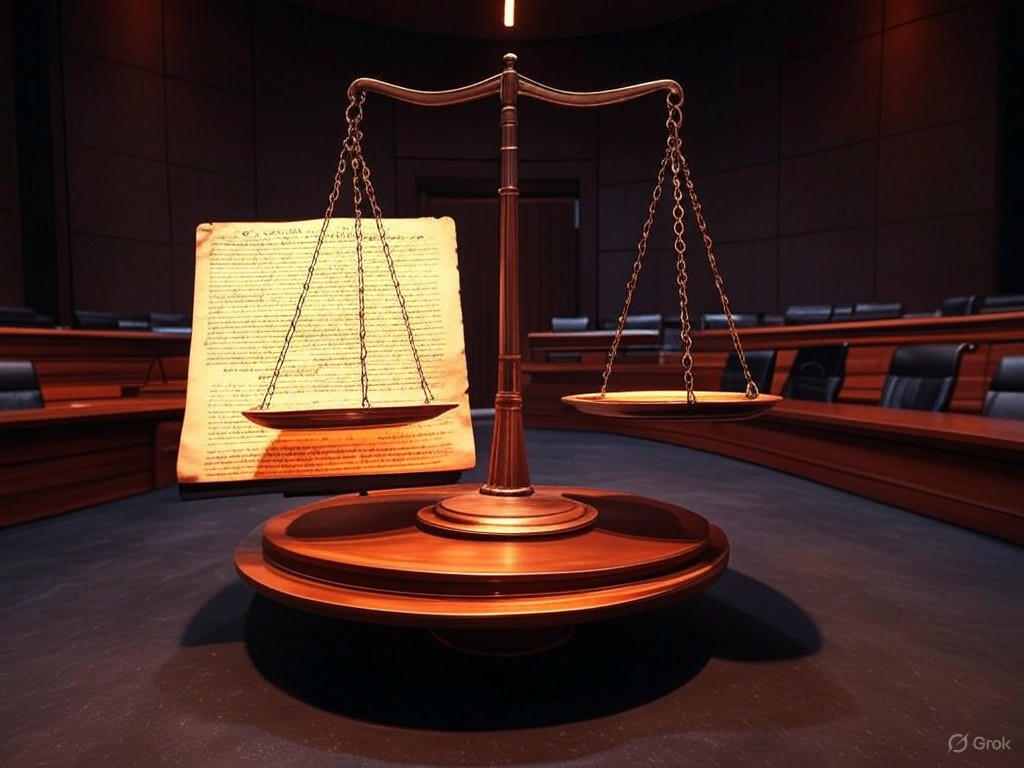
Trump’s Constitution Uncertainty: What He Said in Interview
Due Process Rights in the Spotlight from Trump’s NBC Interview
President Trump’s recent appearance on NBC’s “Meet the Press” has left many questioning his grasp of due process rights, especially as his administration pushes forward with sweeping deportation measures. During the May 4, 2025, interview taped at Mar-a-Lago, host Kristen Welker pressed Trump on whether the Fifth Amendment extends equal protections to citizens and non-citizens alike. Have you ever wondered how foundational constitutional guarantees hold up under political pressure?
Trump’s hesitation was clear when he responded, “I don’t know. It seems it might, but you’re talking about that we’d have to have a million or 2 million or 3 million trials.” This uncertainty about due process rights highlights a potential rift between policy ambitions and legal obligations, sparking debates among legal experts and the public.
Examining Trump’s Views on Due Process Rights
As Trump’s administration ramps up deportations, due process rights for migrants are increasingly at risk. Critics argue that his policies, which include expedited removals and reduced hearings, could undermine the very principles he swore to uphold. For instance, imagine a family seeking asylum only to face swift deportation without a fair review—what does that mean for justice in America?
Due process rights, as outlined in the Fifth Amendment, ensure that no one is deprived of life, liberty, or property without proper legal procedures. Trump’s comments suggest a willingness to prioritize efficiency over these protections, a stance that’s drawn sharp criticism from civil rights groups.
Constitutional Commitments and Due Process Rights Under Scrutiny
When asked directly about his duty to uphold the Constitution, Trump’s reply was telling: “I don’t know. I have lawyers that tell me, they are supposed to tell me obviously what the Supreme Court said.” This response raises flags about his commitment to due process rights and the oath he took to “preserve, protect and defend the Constitution.”
It’s a stark reminder that due process rights aren’t just abstract ideas—they’re the backbone of a fair society. If leaders express doubt about these fundamentals, how can we trust the system to protect vulnerable people? Legal scholars point out that such attitudes could erode public faith in democratic institutions.
Balancing Policy with Due Process Rights
Trump’s deportation tactics have included measures like authorizing judges to deny asylum claims without full hearings and cutting funds for legal aid to unaccompanied minors. These steps aim to streamline operations but often clash with due process rights, leading to courtroom battles. One real-world example is the case of Kilmar Abrego Garcia, deported despite a court order, which underscores the human cost of overlooking these rights.
Despite a Supreme Court ruling mandating his return, the administration’s reluctance adds layers to the debate. What if similar oversights affect more people? Staying informed on due process rights can empower you to advocate for change in your community.
Deportation Policies and Their Impact on Due Process Rights
The administration’s approach to deportations has expanded tools like expedited removals and invoked old laws to target gang members, all while facing accusations of sidelining due process rights. These policies might address security concerns, but they risk creating a precedent where haste trumps fairness. Think about it: How would you feel if basic legal protections were suddenly out of reach?
Public polls, such as one from The Associated Press-NORC Center, show growing unease about executive overreach, with more Americans viewing it as a threat than judicial actions. Due process rights are at the heart of this tension, as they ensure everyone gets a voice, regardless of citizenship.
Legal Challenges to Due Process Protections
Courts have repeatedly affirmed that due process rights apply to all within U.S. jurisdiction, drawing from cases that emphasize equal treatment under the law. Trump’s policies have sparked lawsuits, drawing parallels to historical decisions that safeguard individual liberties. For example, experts reference Miami Herald Publishing Co. v. Tornillo to highlight how government actions must respect constitutional boundaries.
This ongoing scrutiny of due process rights serves as a check on power, reminding us that policies should evolve with, not against, legal frameworks. If you’re interested in civic engagement, consider researching these cases to better understand the stakes.
Broader Implications: Due Process Rights and Executive Actions
Beyond deportations, Trump’s interview touched on other areas, like his offhand remark about Canada as the “51st state,” which, while possibly in jest, adds to perceptions of unconventional constitutional interpretations. Yet, it’s his ambiguity on due process rights that lingers, potentially influencing how future policies handle civil liberties. Does this signal a shift in how we view executive authority?
Electoral transparency and democratic norms are also intertwined, as due process rights underpin fair elections and public trust. In an era of rapid policy changes, maintaining these rights is crucial for a healthy democracy.
Public Discourse on Upholding Due Process Rights
Media coverage has amplified discussions, with outlets like PBS analyzing Trump’s statements and their wider effects. This highlights journalism’s role in defending due process rights by keeping the public informed. As citizens, we can engage by sharing our views or supporting organizations that advocate for these principles.
Looking ahead, the clash between executive agendas and due process rights will likely intensify. Hypothetically, if more policies bypass traditional safeguards, it could reshape how we protect individual freedoms in the U.S.
Future Outlook and Protecting Due Process Rights
As Trump’s term progresses, expect more legal battles over due process rights, from immigration to broader constitutional issues. This isn’t just about one administration—it’s about ensuring that core protections endure for everyone. What steps can we take to safeguard these rights in our daily lives?
One actionable tip is to stay updated on key rulings and participate in local advocacy. By doing so, you contribute to a stronger democracy where due process rights are non-negotiable.
Strategies for Defending Due Process Protections
For those concerned, joining or supporting civil rights groups can make a difference. Simple actions, like voting and discussing these topics with friends, help reinforce due process rights at the grassroots level. Remember, every voice counts in preserving our constitutional foundations.
In wrapping up, Trump’s interview underscores the fragility of due process rights in the face of bold policies. It’s a call to action for all of us to remain vigilant.
Conclusion and Next Steps
President Trump’s comments in his NBC interview reveal deep uncertainties about due process rights, potentially jeopardizing constitutional norms as his deportation plans advance. This ongoing debate reminds us of the need for balance between security and justice.
If this topic resonates with you, I’d love to hear your thoughts in the comments below—share your perspective or how you’ve engaged with similar issues. Feel free to explore more on our site about constitutional matters, and don’t forget to share this post with others who might find it insightful.
References
1. PBS News Hour. “Trump says he doesn’t know if he backs constitutional due process rights in new interview.” Source Link
2. Politico. “I don’t know: Trump on Constitution.” Source Link
3. Knight First Amendment Institute. “Search Engines, Social Media, and the Editorial Analogy.” Source Link
4. Seth’s Blog. “Akimbo Podcast Transcripts.” Source Link
5. Howard University School of Law. “Journal Article on Constitutional Issues.” Source Link
6. European Commission. “Literature Review on Electoral Transparency.” Source Link
7. ACCC. “Impact of Digital Platforms on News.” Source Link
8. Case Western Reserve University. “Privacy-Preserving LER White Paper.” Source Link
due process rights, Trump interview, constitutional rights, deportation policy, fifth amendment, executive overreach, Trump constitution, NBC interview, due process protections, immigration policies






